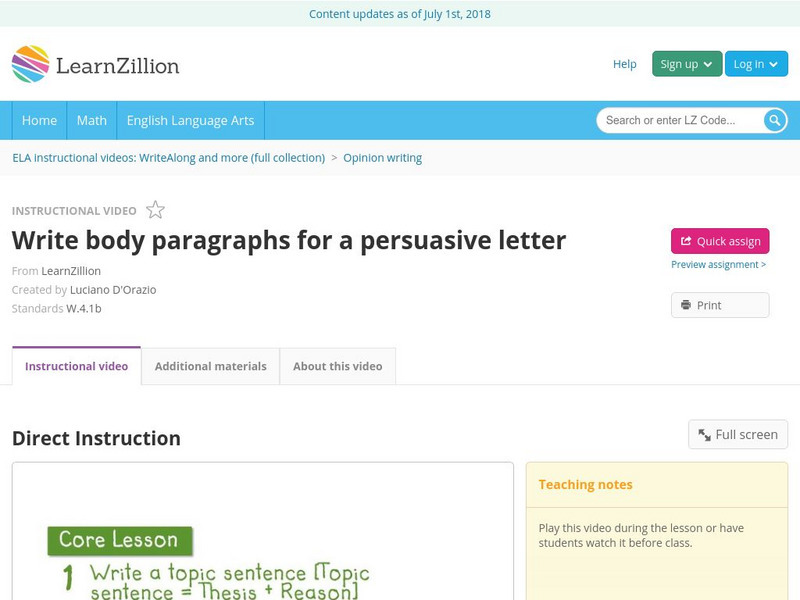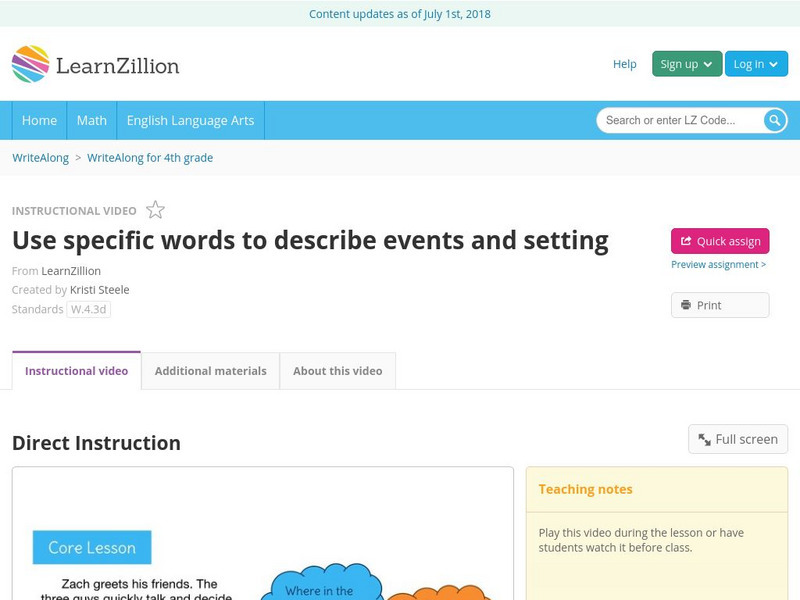Hi, what do you want to do?
Imagine Learning Classroom
Learn Zillion: Draft a Conclusion to a Persuasive Letter
In this lesson, you will learn how to relate the conclusion of a persuasive letter to your opinion by reviewing why your reasons support your opinion and make it convincing. Login gives access to a slideshow as well. [7:15]
Imagine Learning Classroom
Learn Zillion: Write a Conclusion to an Informational Essay
In this lesson, you will learn how to conclude your essay by relating your conclusion to the information presented. Login gives access to a slideshow as well. [7:25]
Imagine Learning Classroom
Learn Zillion: Generate and Choose a Topic for Argumentative Writing
In this lesson, you will learn how to generate ideas for an argumentative essay by making a list of topics. [5:48]
Imagine Learning Classroom
Learn Zillion: Write Body Paragraphs for a Persuasive Letter
In this lesson, you will learn how to write body paragraphs by stating your reason and then supporting it with evidence. [5:05]
Curated Video
You Tube: Narrator Definition, Examples, and Practice
This video and worksheet define narrator and explain how the narrator compares to the author and characters in a story. The video defines each term, then gives excerpts from well-known stories for learners to read and evaluate based on a...
Imagine Learning Classroom
Learn Zillion: Use Specific Words to Describe Events and Setting
In this lesson, students use precise words and phrases to create mental images for their readers, and practice adding specific words to make the writing come alive. [9:29]
ABCkidTV
You Tube: How to Write for Your Audience Writing Video for Kids
This video [4:04] will help you learn how to write for your audience in narrative, informational, and persuasive writing. You'll learn about writing style, formal and informal word choice, and tone.
Imagine Learning Classroom
Learn Zillion: Focusing on the Prompt by Relating Evidence to the Argument
In this lesson, you will learn how to make sure your writing is focused on the prompt by telling the reader how the evidence proves your point. [5:21]
Imagine Learning Classroom
Learn Zillion: Inform a Specific Audience About an Idea by Writing a Persuasive Letter
In this lesson, you will learn how to tell someone specific about your idea by writing a persuasive letter. [4:18]
Imagine Learning Classroom
Learn Zillion: Draft a Concluding Paragraph for a Persuasive Letter
In this lesson, you will learn how to write a memorable closing paragraph by using a plea for action. [4:48]
Imagine Learning Classroom
Learn Zillion: Understand Adverbs
In this lesson, you will learn the function of adverbs by identifying words that describe verbs in sentences. [6:10]
Imagine Learning Classroom
Learn Zillion: Brainstorm Narrative Writing Topics
In this lesson, you will learn how to focus ideas on a topic by making a list. [5:46]
Imagine Learning Classroom
Learn Zillion: Organize Ideas Chronologically for a Narrative
In this lesson, you will learn how to tell your story step-by-step by getting the memory in your head and thinking "What happened first, then next, then next." [5:17]
Imagine Learning Classroom
Learn Zillion: Use Prepositional Phrases to Expand Sentences
Writers add prepositional phrases to add details to their sentences. Let's expand our sentences by adding prepositional phrases. [7:52]
Imagine Learning Classroom
Learn Zillion: Recognize Sentence Fragments and Produce Complete Sentences
Writers produce complete sentences, recognizing and correcting sentence fragments. Let's practice making sure each of our sentences has a subject and a predicate. [9:49]



















